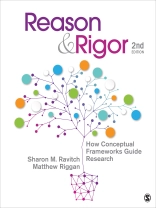Designed for novice as well as more experienced researchers,
Reason & Rigor presents conceptual frameworks as a mechanism for aligning literature review, research design, and methodology. The book explores the conceptual framework—defined as both a process and a product—that helps to direct and ground researchers as they work through common research challenges. Focusing on published studies on a range of topics and employing both quantitative and qualitative methods, the updated
Second Edition features two new chapters and clearly communicates the processes of developing and defining conceptual frameworks.
Tabla de materias
Chapter 1: Introduction to Conceptual Frameworks
Conceptual Frameworks Explored and Defined
Elements of a Conceptual Framework
Organization of this Book
Concluding Thoughts: Using Conceptual Frameworks
Chapter 2: Why Conceptual Frameworks?
What (and Where) is Theory?
Whose Theory is It, and Where Does It Come From?
What is a Literature Review, and What is It For?
The Case for Conceptual Frameworks: Concluding Thoughts
Chapter 3: Origins of a Conceptual Framework: The Birth of Grit
Background and context: An overview of the work in focus
The argument
Origins: Conversations with the dead and the living
Formulating the concept: From conversing to inquiring
Forming and advancing the argument
Chapter 4: Excavating Questions
“Excavating” Research Questions
About the Author
Background and Context: An Overview of the Work in Focus
The Argument
Conceptual Frameworks and Research Design
The Co-evolution of Conceptual Frameworks and Research Design
Conceptual Frameworks and Research Design: Concluding Thoughts
Reflection Questions
Chapter 5: The Role of the Conceptual Framework in Data Collection and Fieldwork
Who You Are, How You Think, and What You Study
About the Author
Background and Context: An Overview of the Work in Focus
The Argument
Hyphenated Selves as a Theoretical Framework
The Hyphen as Method: Positionality and Practice
Conceptual Frameworks and Fieldwork: Concluding Thoughts
Chapter 6: Conceptual Frameworks and the Analysis of Data
Examining the Influence of an Ever-Emerging Conceptual Framework
About the Author
Background and Context: An Overview of the Work in Focus
The Argument
From Argument to Analysis
Transcription as Data Analysis
Evolving and Shifting Frameworks of Analysis
Conceptual Frameworks and Data Analysis: Concluding Thoughts
Chapter 7: Expanding the Conversation, Extending the Argument: The Role of Conceptual Frameworks in Presenting, Explaining, and Contextualizing Findings
About the Author
Background and Context: AN OVERVIEW OF THE WORK IN FOCUS
Being in Conversation With Theory: Influences on Thought and Action
The Argument
Conclusion
Chapter 8: Reflections on the Making and Re-making of a Conceptual Framework – William K. Dunworth
Developing a Conceptual Framework
Challenges in the field
Revisiting Conceptual Frameworks: Turning Artifacts into Processes
“Everything is data”: Returning to the field
Revising the conceptual framework and integrating findings
Chapter 9: The Conceptual Framework as Guide and Ballast
Developing a Conceptual Framework
Starting Points: Self and Audience
Making—and Breaking—Your Plans
The Conversation: From Listening to Speaking
Strategies and Exercises for Developing Conceptual Frameworks
Identifying Your Interests, Beliefs, and Motivations for Doing Research
Examination of the “Conversations Already Happening”
Ongoing Questions and Concerns about the Research
Concept Maps
Research Memos
Research Journal
Reason and Rigor
Sobre el autor
Matthew Riggan, Ph.D., is a Senior Researcher at the Consortium for Policy Research in Education at the University of Pennsylvania, and an Adjunct Assistant Professor in Penn’s Graduate School of Education. His current research focuses on formative assessment in elementary mathematics; assessing analytic and problem-solving skills for postsecondary readiness; systemic reform to support science, technology, engineering and mathematics (STEM) education; and factors supporting or undermining the scale-up of promising reforms in urban school districts. He teaches courses in qualitative research design, data collection, and analysis, and has worked extensively on developing qualitative and mixed methods approaches to program theory evaluation and analysis of video data. He holds a doctorate in Anthropology and Education from the University of Pennsylvania.












